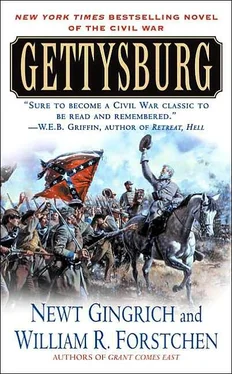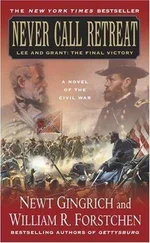Newt Gingrich - Grant Comes East
Здесь есть возможность читать онлайн «Newt Gingrich - Grant Comes East» весь текст электронной книги совершенно бесплатно (целиком полную версию без сокращений). В некоторых случаях можно слушать аудио, скачать через торрент в формате fb2 и присутствует краткое содержание. Жанр: Исторические приключения, на английском языке. Описание произведения, (предисловие) а так же отзывы посетителей доступны на портале библиотеки ЛибКат.
- Название:Grant Comes East
- Автор:
- Жанр:
- Год:неизвестен
- ISBN:нет данных
- Рейтинг книги:3 / 5. Голосов: 1
-
Избранное:Добавить в избранное
- Отзывы:
-
Ваша оценка:
- 60
- 1
- 2
- 3
- 4
- 5
Grant Comes East: краткое содержание, описание и аннотация
Предлагаем к чтению аннотацию, описание, краткое содержание или предисловие (зависит от того, что написал сам автор книги «Grant Comes East»). Если вы не нашли необходимую информацию о книге — напишите в комментариях, мы постараемся отыскать её.
Grant Comes East — читать онлайн бесплатно полную книгу (весь текст) целиком
Ниже представлен текст книги, разбитый по страницам. Система сохранения места последней прочитанной страницы, позволяет с удобством читать онлайн бесплатно книгу «Grant Comes East», без необходимости каждый раз заново искать на чём Вы остановились. Поставьте закладку, и сможете в любой момент перейти на страницу, на которой закончили чтение.
Интервал:
Закладка:
At the same time orders had streamed out as far away as Maine and northern Minnesota, pulling in reserves of tent-age, uniforms, shoes, rations, bandages, field pieces, serge bags for powder, pistol ammunition, horses, mules, oats, chloroform, canned milk, tinware, cooking pots, rifles, packaged cartridges for Springfields, Sharps, and Spencers. Any boxcar to be found on a siding, any wheezy locomotive that could still pull that boxcar was coming in as well, commandeered from across the country to bring forth what was spilling out of the cornucopias made of brick and iron and steam.
The nation was stirring as it had never done before, even as it reeled from the disaster dealt to it by the legions of Robert E. Lee.
The rail yard rumbled with noise, whistles shrieking, cars banging together as they were hooked up. The crews were laboring to load up wood, water, stacking up boxes of rations under open-sided warehouses. Frightened horses cried out and struggled as they were forced into boxcars, men cursing and yelling.
It looked like chaos, but Haupt knew better. He had brought with him more than four hundred of his best men from Alexandria on one of the last trains to get out of Washington before the line was cut just north of Baltimore. They knew their business and, in what appeared to be chaos, there was order. Inbound trains were being shifted to side railings, engines disconnected, run to a turntable, shifted around, greased, oiled, refueled, water tanks filled, then moved up a side track to pick up an outbound load. With the arrival of the first division to come up from Vicksburg, this machinery of a nation at war would surge into motion.
A small rail yard office, which Haupt had selected for the meeting, loomed up through the swirls of smoke and rain, the guards posted out front snapping to attention at the approach of so many stars. A gathering of hangers-on, curious citizens, and a dozen or more reporters stood back at a distance, kept there by a provost guard with direct orders from Haupt, fully supported by Elihu, to arrest anyone who tried to break through.
The reporters shouted their questions, which were all ignored, Sherman looking over at them with a jaundiced eye and muttering a curse under his breath.
"Damn them, now it will be in every paper in the country that we're here," Sherman snapped.
"They knew already," Elihu interjected. "Word of it was coming up the river your entire trip. No use in hiding it; besides, the country needs to hear it."
"Just for once I'd like to move without everyone, especially the rebs, knowing about it first."
Still muttering under his breath, Sherman followed Haupt into the room, the door closing behind them, window shades pulled down.
A fresh pot of coffee rested on a sideboard, bread and slabs of cut ham on tin plates. Sherman and Porter helped themselves, Grant simply taking a cup of coffee and sipping from it as he walked up to the table, upon which was spread a railroad map of the country. He gazed at it for a moment, then went to the wall where Herman had put up a map of northern Virginia, Maryland, and southern Pennsylvania. Red and blue pins, with small foolscap notes under them, marked the latest positions of forces.
Grant turned to Elihu.
"What's the latest?"
Elihu tossed the Chicago Tribune on the table, then pulled a notebook out of his pocket and opened it
"Washington has been cut off from all land communications for the last three days. Stuart's cavalry has cut all telegraph lines and rail lines to the capital. The line into Baltimore was patched yesterday but went down again this morning. Last report from Baltimore was of rioting. Rioting reported as well in Philadelphia, New York, and Cincinnati."
"The hell with the rioting," Sherman said coldly. "What about Lee?"
"He moved from Westminster five days ago, heading toward Washington. He's put up a good screen, no solid reports as to disposition. A courier boat out of Washington docked at Port Deposit on the north bank of the Susquehanna this afternoon with a report that Confederate infantry was reported ten miles to the north of Washington, at Rockville."
"Of course," Grant said quietly. "He has to try it. It's his one chance to win quickly."
"The rain has slowed him down," Haupt interrupted. "Every river is at flood, otherwise Lee could have been into the Washington area three days ago. Old Sam Heintzelman is in command of the garrison in Washington. He sent out some pioneer troops in front of Lee's advance. They've destroyed every bridge and mill dam north of the city and made a real mess of things."
Grant nodded approvingly and sat down at the table, a signal for the rest to join him.
Haupt sat down directly across from him, Elihu at his side.
'Tell me everything, start at the beginning," Grant said quietly, leaning back, rubbing his eyes, then putting down the cup of coffee. Fishing in his breast pocket, he pulled out a cigar, struck a Lucifer, and puffed the cigar to life.
Haupt began his narrative, describing the maneuvers that led to a meeting at Gettysburg, the flanking march of Lee to Westminster, the chaos at the supply head, the debacle at Union Mills, the disintegration of the Army of the Potomac, and the hellish retreat of the survivors to the Susquehanna, finishing with his meeting with Lincoln.
Grant did not interrupt, sitting quietly, wreathed in smoke, stubbing out the end of his cigar and lighting another one, the smoke drifting thick around the coal oil lamp that hung from the ceiling.
While Sherman stood silent, Porter stood up to stretch, walking over to study the map, reaching into his pocket for a flask, which he half emptied into his coffee. He made eye contact with Grant, motioned to the flask. Grant shook his head.
There was a moment of silence and Elihu cleared his throat.
"The political situation, General, to put it bluntly, is on the point of collapse." "Go on."
"First off, the riots. It's reported that New York is controlled by the mob; scores, perhaps hundreds dead. More than half the city has gone over to the rioters."
"What's being done?"
"General Sickles has been dispatched with a brigade of troops from his corps."
Haupt said nothing. Sickles's move had not been authorized by any real order from above. He had simply announced that as a general from New York he was going there personally to straighten things out and Herman had reluctantly agreed to give him ten trains to move his men from Harrisburg to Jersey City.
"No one had said it openly yet, but the president will most likely face a delegation from Congress, perhaps already has done so, calling upon him to seek a negotiated settlement."
"He won't do it," Grant replied.
"I know he won't. But if Washington should fall, the point might be moot"
"Then we move the capital back to Philadelphia," Sherman said. "During the Revolution we did that. The British burned us out in 1814, and we survived it."
"The capital cannot fall," Elihu replied sharply. "It cannot. If we lose that, I can promise you that the members of Congress from every border state will back off from this war, as will more than one from the Midwest. That is what you must prevent."
Grant shook his head.
"I can't guarantee that we can save Washington. President Lincoln will not want me to throw away an army on a forlorn hope, and if I rush into this fight without preparation, it will be a forlorn hope. To defeat General Lee will take time, sir, and cannot be done with the snap of a finger. If we lose this army now"-and he gestured out the window toward the boats discharging the soldiers of the West-"we will lose this war."
"Congressman Washburne," Grant turned toward his old friend and mentor, "you must convey to the president that I fully understand the political crisis we are in and I will do everything I can, as quickly as possible, in response. The mere fact that we're coming east, even if with but one division to start, will send a message to Lee, and exert pressure on him as well. It will tell him we have not given up, not by a long shot, and will force him to perhaps act rashly.
Читать дальшеИнтервал:
Закладка:
Похожие книги на «Grant Comes East»
Представляем Вашему вниманию похожие книги на «Grant Comes East» списком для выбора. Мы отобрали схожую по названию и смыслу литературу в надежде предоставить читателям больше вариантов отыскать новые, интересные, ещё непрочитанные произведения.
Обсуждение, отзывы о книге «Grant Comes East» и просто собственные мнения читателей. Оставьте ваши комментарии, напишите, что Вы думаете о произведении, его смысле или главных героях. Укажите что конкретно понравилось, а что нет, и почему Вы так считаете.












